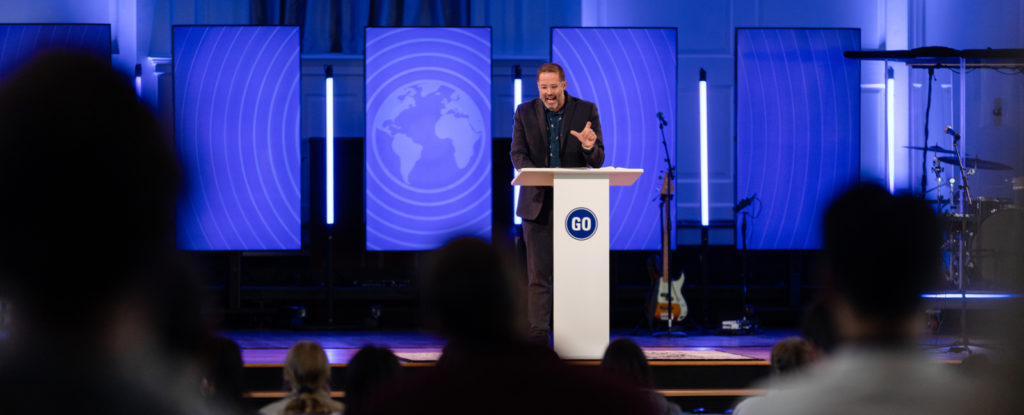Confrontation and Connection: Dan Strange Delivers Page Lectures on Elenctic Civility
Chad Burchett | October 21, 2022

On October 18-20, Southeastern Baptist Theological Seminary (SEBTS) welcomed Dan Strange, Director of Crosslands Forum and visiting professor at SEBTS, for several campus talks, including the annual Page Lectures.
During Tuesday’s chapel message, Strange preached from Isaiah 41 about the Christian’s stable identity in God in a world plagued by the fear of approaching menaces. Strange observed that just as the Israelites were unable to see God’s sovereign hand behind the march of King Cyrus, many today are blinded to God’s presence and providence amid life’s stresses and need to be called to repentance and faith.
“When humans are faced with an approaching menace, we know that we need to build something to protect us, and we think that the thing we make for ourselves will protect us,” noted Strange. “The problem is that the things we make to give us protection are not God. … We make blind and mute idols and we become like them.”
This blindness and instability, however, should not characterize the people of God. As Strange encouraged attendees, “In the living God, the people of God have an external source that is forever stable and not shaky. The identity of the people of God is stable and not shaky — not liquid but solid — because God is solid. … As we are united to Christ by his Spirit, his identity becomes ours.”
The Christian’s response, then, should be to herald the peace, security, and hope found in Christ that will satisfy the world’s deepest longings. “With confidence we proclaim to the scared, shaky people all around us the hope and certainty that the Lord of history offers,” shared Strange. “We call the nations to Christ.”
With confidence we proclaim to the scared, shaky people all around us the hope and certainty that the Lord of history offers. We call the nations to Christ.
On Wednesday, Strange shared about his most recent book, “Making Faith Magnetic: Five Hidden Themes our Culture Can’t Stop Talking about and How to Connect Them to Christ.” In the book, Strange describes how Christians can meaningfully connect with non-Christians, addressing magnetic points of contact that target people’s deepest longings. These longings or “itches” predominate contemporary culture, requiring the Church to share and apply the gospel in a way that helps people see how Christ satisfies their longings.
As Strange reminded attendees, this practice will require the Church to develop an all-of-life approach to evangelism and discipleship — an approach that finds its seed in the Great Commission. As Strange notes in the introduction to his book, “What Jesus in the Great Commission calls ‘disciple-making’ is nothing other than allowing the gospel to transform every part of our lives. … If I’m applying the gospel to my life so that I have a full, rich relationship with Jesus through all the moments of mundane everyday living, then I’ll be able to minister to others. If I’m connecting the dots in my everyday story, then I’ll be much better equipped to connect the dots in your ‘everyday’ story.”
What Jesus in the Great Commission calls “disciple-making” is nothing other than allowing the gospel to transform every part of our lives.
For his first message in the two-part Page Lectures, Strange challenged chapel attendees on Thursday to reclaim “civil elenctics” as a means of discipleship, pre-evangelism, and cultural engagement. Elenctics, the discipline of confronting the idols and ideologies of the world and calling them to repentance and faith, is a neglected practice in today’s cultural climate, and when practiced, elenctics is rarely characterized by civility. According to Strange, the Church needs to rediscover an attitude of charity and winsomeness in its engagements with culture.
“However, being civil does not mean that we do not have convictions,” Strange reiterated throughout the lecture. “The framing for our Christian civility is a passionate intensity that is not only convicted but also elenctic in its shape. … Elenctics calls non-Christian religions to a position of responsibility and attempts to convince their adherents of sin and to move them to repentance and conversion.”
Elenctics is humbling labor because the Christian must let the gospel cut her own heart and expose her own sin before attempting to confront other people’s sin and call them to repentance and faith. “Our witness and evangelism will be most effective when they flow from our discipleship,” Strange shared. “How do our gatherings and means of grace keep us magnetized by Jesus and not pulled away by the magnetic power of sin, pious self-excitement, and religious inventiveness? The worship of God, the nurturing of the believer, and the evangelization of the unbeliever are not three missions that battle for supremacy but are all part of one mission.”
The worship of God, the nurturing of the believer, and the evangelization of the unbeliever are not three missions that battle for supremacy but are all part of one mission.
In part two of his lecture on Thursday evening, Strange explained how addressing five magnetic points of contact (longings for totality, norm, deliverance, destiny, and higher power) may help Christians to gain traction in evangelism and create conversational space to talk about Jesus as true satisfaction for the soul. “In Jesus we find true connection and belonging,” noted Strange. “Any other way leads to disillusionment and disappointment.”
“Through elenctics, we show that Jesus Christ is the only one who can deal with our longings, but first we have to expose idolatrous longings,” shared Strange. “When the gospel meets culture, there is always a confrontational element. As we proclaim the gospel to people who are in darkness and are dead and are suppressing the truth in unrighteousness, the gospel will always have a confrontational element that demands repentance and faith.”